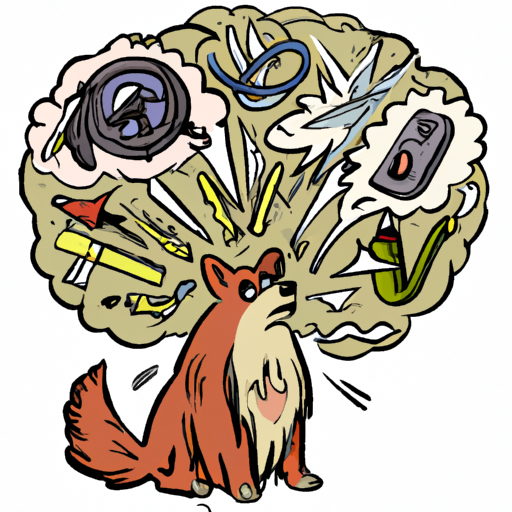Understanding Canine Anxiety
Like humans, dogs can experience anxiety. This emotional state can arise from various factors, including past trauma, environmental changes, or genetic predispositions. As a caregiver, understanding and identifying the signs of anxiety can help you provide the best care for your furry friend.
Common Causes of Anxiety in Dogs
Canine anxiety can be triggered by numerous factors. It’s essential to note that what might seem insignificant to us can be highly stressful for a dog. Here are some common causes:
- Fear-related anxiety: This can be caused by loud noises (thunder, fireworks), visual stimuli (hats, umbrellas), unfamiliar environments, or specific situations like vet visits.
- Separation anxiety: Dogs are pack animals and can become anxious when left alone.
- Aging: Older dogs can develop cognitive dysfunction syndrome (CDS), leading to memory, perception, and awareness changes, causing anxiety.
Recognizing Symptoms of Anxiety in Dogs
Dogs communicate their anxiety through their behavior. As a caregiver, being aware of these signs can help alleviate their stress. Here are some common symptoms:
- Aggression
- Urinating or defecating in the house
- Drooling
- Panting
- Destructive behavior
- Depression
- Excessive barking
- Pacing
- Restlessness
- Repetitive or compulsive behaviors
Treatment and Management of Canine Anxiety
The first step in managing your dog’s anxiety is to consult with a veterinarian or a certified animal behaviorist. They can guide you on the best course of action, which may include:
- Behavioral training: This method involves desensitization and counter-conditioning to help your dog cope with stressors.
- Medication: In severe cases, your vet may prescribe anti-anxiety medications.
- Dog-appeasing pheromones (DAP): These synthetic pheromones can help soothe anxious dogs.
- Complementary therapies: Techniques like massage, acupuncture, or herbal remedies can also be considered.
| Treatment Method | Pros | Cons |
|---|---|---|
| Behavioral Training | Non-medical, sustainable | Requires time and patience |
| Medication | Quick effect, vet-controlled | Possible side effects |
| DAP | Non-invasive, easy to use | May not work for all dogs |
| Complementary therapies | Holistic approach | Efficacy varies |
Preventing Anxiety in Dogs
Prevention is always better than cure. Here are some tips to help prevent anxiety in dogs:
- Socialize your puppy early.
- Provide a stable, stress-free environment.
- Regular exercise and mental stimulation.
- Avoid leaving your dog alone for extended periods.
- Regular check-ups with the vet.
FAQs
Q: Can dogs outgrow anxiety?
A: Some dogs may outgrow their anxiety, but it’s usually a condition that needs to be managed over a lifetime.
Q: Can I use human anti-anxiety medication for my dog?
A: No. Always consult your vet before administering any medication to your dog.
Q: Is my dog’s breed more prone to anxiety?
A: Some breeds may be more susceptible to anxiety, but it can affect any dog, regardless of breed.
Q: Can a change in diet help my dog’s anxiety?
A: Diet can play a role in a dog’s overall mood and behavior. Speak to your vet about the best dietary options for your dog.
Q: Does anxiety shorten my dog’s lifespan?
A: Chronic stress or anxiety can potentially lead to health complications, impacting your dog’s quality of life and possibly their lifespan. Adequate management can help mitigate these risks.



